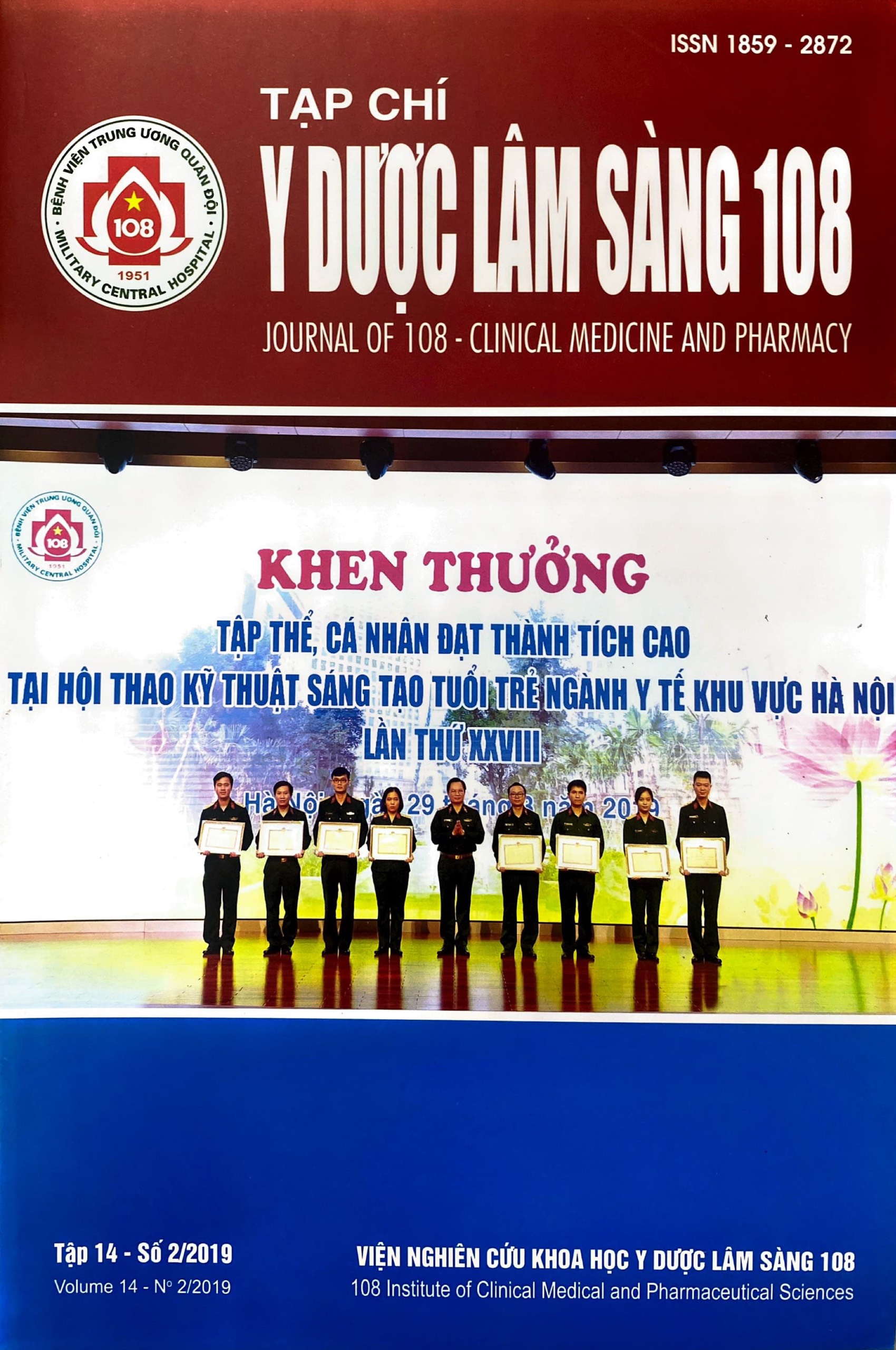Studying the changes of respiratory resistance and reactance using forced oscillation technique in chronic obstructive pulmonary disease patients
Main Article Content
Keywords
Abstract
Objective: To assess the changes of respiratory resistance and reactance using forced oscillation technique in chronic obstructive pulmonary disease (COPD) patients. Subject and method: The study has been done in 108 Military Central Hospital from October 2017 to November 2018, among 200 normal subjects and 200 COPD patients, included 150 stable COPD patients and 50 COPD patients with exacerbations. Respiratory resistance (Rrs5 and Rrs20) and reactance (Xrs5) and pulmonary function tests were measured by MostGraph-02 (Chest M.I., Co. Ltd., Tokyo, Japan) in 200 normal subjects and 150 stable COPD patients. For 50 COPD patients with exacerbations, only respiratory resistance (Rrs5 and Rrs20) and reactance (Xrs5) were measured. Result: Parameters of pulmonary function tests in patients had been decreased: FVC: 2.81 ± 0.52L; FVC%: 86.6 ± 12.8%, FEV1: 0.85 ± 0.34L, FEV1%: 53.1 ± 22.9%, FEV1/FVC%: 52.4 ± 10.6%, FEF 25-75%: 25.6 ± 13.8%, PEF%: 27.4 ± 14.9%. Respiratory resistance and reactance in stable COPD patients: Rrs5: 0.403 ± 0.083kPa/L/s, Rrs20: 0.338 ± 0.064kPa/L/s, Xrs5: -0.132 ± 0.087kPa/L/s, in exacerbations COPD patients Rrs5: 0.501 ± 0.135kPa/L/s, Rrs20: 0.383 ± 0.098kPa/L/s, Xrs5: -0.176 ± 0.063kPa/L/s. Respiratory resistance Rrs5 and Rrs20 were higher and reactance Rrs5 more negative in exacerbations COPD patients than in stable COPD patients. Respiratory resistance Rrs5 and Rrs20 were higher and reactance Xrs5 more negative in patients than in normal subjects (Rrs5: 0.332 ± 0.065kPa/L/s, Rrs20: 0.251 ± 0.078kPa/L/s, Xrs5: -0.0061 ± 0.0012kPa/L/s). Conclusion: Respiratory resistance Rrs5 and Rrs20 were higher and reactance Xrs5 more negative in patients than in normal subjects with p<0.05.
Article Details
References
2. Bùi Xuân Tám (1999) Thăm dò thông khí phổi, các hội chứng rối loạn thông khí phổi và các thành phần khí máu. Bệnh hô hấp, Nhà xuất bản Y học tr. 108-121.
3. Nguyễn Thị Yến, Trịnh Thị Huyền Trang (2012) Lực cản đường thở ở bệnh nhi bị hen phế quản từ 5 - 12 tuổi. Tạp chí Nghiên cứu Y học, 80(3A), tr. 137-142.
4. Ana Maria GT Di Mango, Agnaldo JL, Jose´ MJ, Pedro LM (2006) Changes in respiratory mechanics with increasing degrees of airway obstruction in COPD: Detection by forced oscillation technique. Respir Med 100: 399-410.
5. GOLD (2018) Global strategy for diagnosis management, and prevention of COPD 2018.
http://www.goldcopd.org.
6. Landser FJ, Cle´ment J, Van de Woestijne KP (1982) Normal values of total respiratory resistance and reactance determined by forced oscillations: Influence of smoking. Chest 81: 586-591.
7. Mori K, Shirai T, Mikamo M et al (2011) Colored 3-dimensional analyses of respiratory resistance and reactance in COPD and asthma. COPD 8: 456-463.
8. Pasker HG, Schepers R, Clément J, Van de Woestijne KP (1996) Total respiratory impedance measured by means of the forced oscillation technique in subjects with and without respiratory complaints. Eur Respir J 9: 131-139.
9. Sá PM, Lopes AJ, Melo PL (2013) Oscillation mechanics of the respiratory system in never-smoking patients with silicosis: Pathophysiological study and evaluation of diagnostic accuracy. Clinics (Sau Paulo) 68(5): 644-651.
 ISSN: 1859 - 2872
ISSN: 1859 - 2872
